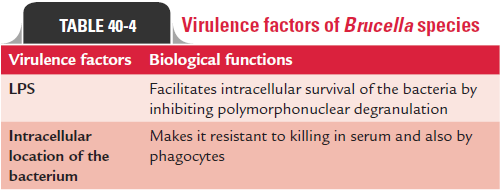Chapter: Microbiology and Immunology: Bacteriology: Brucella
Pathogenesis and Immunity - Brucella
Pathogenesis and Immunity
Brucella species have predilection for intracellular growth, hencemay be demonstrated inside phagocytes. Intracellular location of theBrucella explains the relative resistance of the bacterium to chemotherapy.
◗ Virulence factors
LPS is the principle virulence factor of Brucella spp. Intracellular location of the bacteria makes them resistant to killing in serum and also by phagocytes (Table 40-4).

◗ Pathogenesis of brucellosis
Brucellosis is a systemic disease in humans that can involve almost any organ system. They enter through (a) abra-sion or cut in the skin, (b) conjunctiva, (c) respiratory tract,
Shortly after gaining entry to the body, brucellae are rapidly ingested by polymorphonu-clear leukocytes, which are attracted to the site of inflamma-tion. But inside the leukocytes, the brucellae are not killed due to the presence of enzyme superoxide dismutase, O polysac-charide of LPS, and nucleotide-like substances produced by the bacteria. Brucellae that are not killed by leukocytes spread from the site of infection to the local lymph nodes which drain the site of infection. Inside the lymph glands, the bac-teria multiply and are released to the blood stream following rupture of the cells and are phagocytosed by the macrophages.
Bacteria present in the macrophages are then carried to the organs of reticuloendothelial system, such as liver, spleen, bone marrow, lymph nodes, and kidney. In these organs, brucellamultiply in phagosomes of macrophages due to production of adenine and guanine monophosphate, which inhibits the phagolysosome fusion, oxidative burst activity, and tumor necrosis factor production.
Apart from the organs of reticuloendothelial system, any other organ system (central nervous system, heart, joints, geni-tourinary system, pulmonary system, and skin) can be involved in brucellosis.
◗ Host immunity
Immunity in brucellosis, like other obligate intracellular pathogens, is primarily cell-mediated immunity. Activated macrophages are primarily responsible for killing the bacteria by producing interferon gamma and other cytokines. It is sug-gested that antibody, complement, and macrophage-activating cytokines also play a supportive role in controlling multiplica-tion of extracellular bacteria or in early infection. The humoral immunity is characterized by production of antibodies against LPS of the bacteria. However, even in the presence of opsonic activity, these serum antibodies against LPS do not provide any protective immunity against bacteria.
Related Topics